Yesterday, I posed this question: Did Bruce Weber violate any agreement with the University of Illinois? If so, does such a violation void the university’s obligation to pay Weber’s $4,062,023.79 buyout?
Today, I present the materials necessary to answer that question. First is the September 2011 Restatement, Weber’s final employment contract. The following slideshow features the entire contract. The last two slides highlight the liquidation clause and the “mutual release” demanded by that clause. These are public documents.
The September 2011 Restatement contained two criteria that would release the University from its obligation to pay Weber’s buyout. The first criterion concerns “major violations” of NCAA bylaws. The second concerns “immoral conduct.”
Weber’s post-firing comments do not violate either of these provisions. However, the 2011 Restatement became inoperative on March 9, the day Weber was fired. Thus, the following section is irrelevant. It may nevertheless be interesting.
NAVIGATING THE LEGALESE
For guidance through murky contractual language, I emailed Weber’s attorney, David Sholem, these two questions:
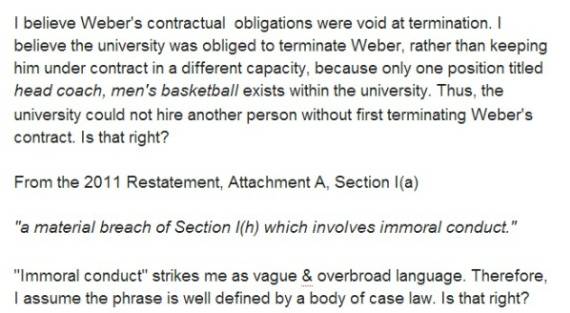
The termination clause, which includes the “immoral conduct” clause, and the referenced paragraph “Section I(h)” are here:
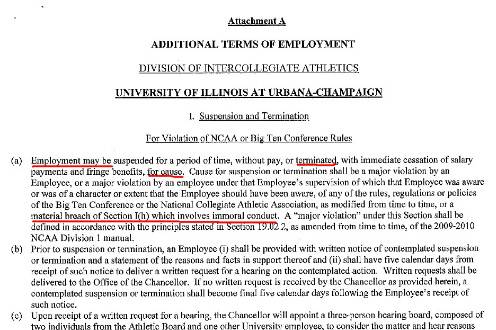
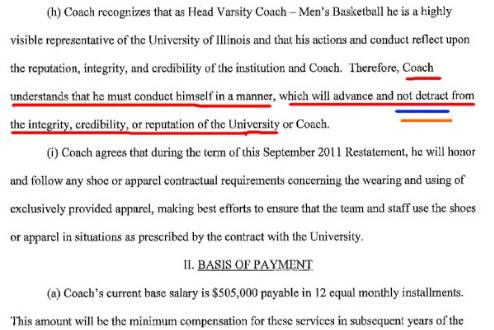
Mr. Sholem responded to the first & second questions:

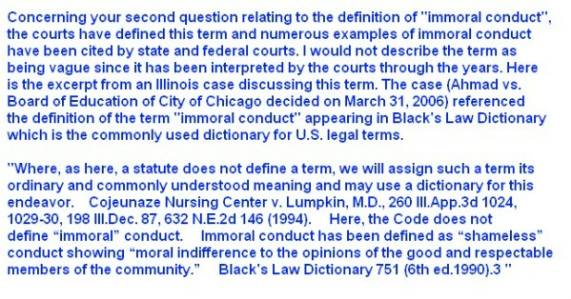 RETURNING TO THE RELEVANT
RETURNING TO THE RELEVANT
At the moment of Weber’s firing, the liquidity clause of his contract and the “mutual release” it required became the only operative portions of that legal document.
“Mutual release” might also be phrased “hold harmless.” Colloquially, it could be called an “I promise not to sue you” agreement. Weber was obliged to sign this release, and abide by its conditions, in return for the $4,062,023.79 buyout.
The mutual release was not a codicil, nor a final restatement to Weber’s employment contract. It was an entirely novel agreement with the University. Within this new document, in three different turns of phrase, Weber agreed to make no claims against the University.
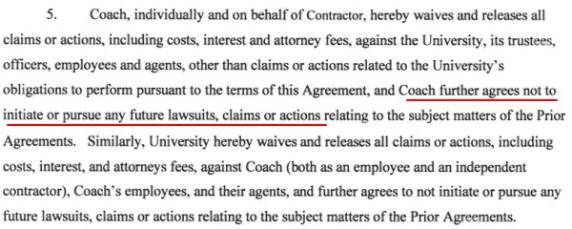
The mutual release executed on April 17, after which time Weber’s claims against the University (its employees and agents) achieved significant attention in the media, but zero filings in courts of law. Thus, the $64,000 question (adjusted for inflation to $3.9 million) is whether Weber’s claims amount to “claims.”
As Bill Clinton might say, it depends on what the word “claims” claims.
Does Weber’s claim — that his 2012 Illini “would’ve made the NCAA tournament” but for Mike Thomas’s incompetence and meddling — qualify as a “claim?” What about Weber’s claim that Mike Thomas never met with him one-on-one?
Can the phrase “future lawsuits, claims or actions” be interpreted as a triple redundancy referring only to lawsuits?
The general rule in statutory interpretation is that courts presume against redundancy.
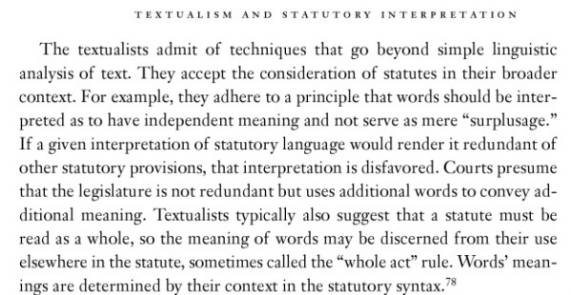
But statutes are not contracts. Does the same rule apply?
University Counsel Thomas Bearrows answered that question: “The language in the Weber agreement to which you refer is neither superfluous nor redundant.”
That seems cut and dried.
But Bearrows also added, “it is standard ‘release’ language often used in an employment setting, including at the University of Illinois and at other institutions and businesses.”
Steve Ross, who taught Sports Law at Illinois before joining the founding law faculty at Penn State, suggests the language is mostly backwards looking: “It clearly would forestall a LEGAL claim by Weber that the AD interfered with his ability to perform his job. Whether the agreement forestalls public complaining about it is likely to turn on whether there is a confidentiality clause.”
The inclusion of a confidentiality clause seems unlikely in a contract that expressly stipulates its own public nature, but Ross speculates that “some contracts that are subject to freedom of information requests have confidentiality clauses.”
Weber’s attorney David Sholem also highlighted the retrospective view:
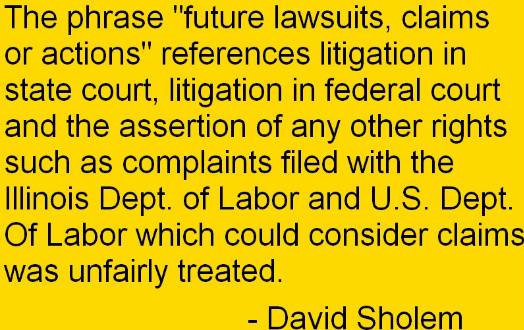
So what’s the answer? It’s worth $3.9 million dollars. But the Division of Intercollegiate Athletics, still struggling to return Illinois basketball to the brand status enjoyed under Bill Self, would not necessarily discontinue payments simply because it can. (We can assume Illinois paid the first installment on April 30 of this year.)
Illini basketball fans will argue about Weber. They will claim he was good or bad for the University. They can fight among themselves about his post-firing comments. But they can’t rescind his annual payments. Only the DIA or university administration can pursue a rescission or negation of the final agreement. That makes it a political decision. Thus, it just depends on which way the wind is blowing.








